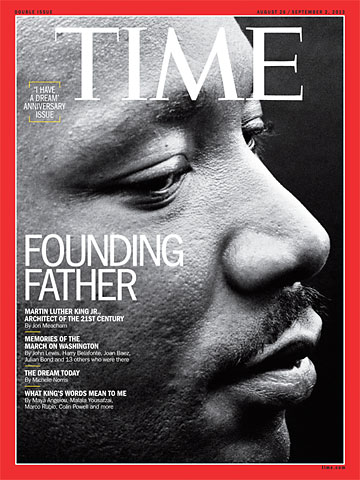
(4 of 6)
It was, it turned out, not only orderly but also integrated. Baker wrote of Bob Dylan, Charlton Heston and Marlon Brando; the paper took note of the series of speeches and songs, including Jackson's "I Been 'Buked and I Been Scorned," a spiritual delivered with such power that Baker reported Jackson's voice seemed to echo off the far-off Capitol. Speaker after speaker--the young John Lewis, the aged A. Philip Randolph--made the case for racial justice. "For many, the day seemed an adventure, a long outing in the late summer sun--part liberation from home, part Sunday School picnic, part political convention, and part fish-fry," James Reston wrote in his piece for the Times the next day.
Watching King's speech in the White House, Kennedy listened with appreciation, then readied for a meeting with the march's leadership to discuss the practical steps ahead to push legislation through a Congress still dominated by white-segregationist Democrats. The ensuing session did not produce much in the way of progress. Kennedy feared moving too quickly, and as they had said again and again all afternoon, the civil rights delegation from the Mall believed the time for action was at hand. Yet King, who craved forward motion, had spoken of delay and of dreams deferred. The pilgrimage would be long, he had told his listeners, and the pilgrims had to maintain the moral high ground they had so effectively claimed through nonviolence. "And that is something that I must say to my people who stand on the worn threshold which leads into the palace of justice," King had told the crowd. "In the process of gaining our rightful place, we must not be guilty of wrongful deeds ... We must forever conduct our struggle on the high plane of dignity and discipline." If the politicians were too slow, well, that meant there had to be yet more dignity and yet more discipline.
The Times' Reston, a reliable barometer of Establishment opinion, however, believed the day had in fact accomplished something, even if JFK was less than enthusiastic late that afternoon. "The demonstration impressed political Washington because it combined a number of things no politician can ignore," wrote Reston. "It had the force of numbers. It had the melodies of both the church and the theater. And it was able to invoke the principles of the founding fathers to rebuke the inequalities and hypocrisies of modern American life."
FREEDOM--SORT OF--AT LAST
Kennedy had not met with king and his comrades alone on the afternoon of Aug. 28. In the President's party was his generally unhappy Vice President, Lyndon Johnson.
